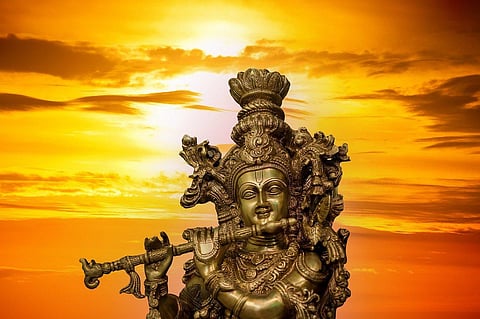

Encouraged by your response to the stories of Surdas, Eknath and Tukaram, I would like to retell the tale of Karmabai of Puri, which derives partly from the 18th-century book of saints, Bhakta Vijaya.
Karmabai lived in the early 17th century. She had an enchanted childhood and eventually her parents married her off.
Life was blissful for Karmabai in her new home and one day she discovered that she was pregnant. When she was about three months along, her husband Dhunu went on some work to a nearby town but failed to return. A bullock cart trailed the next day bearing his corpse. Dhunu had been gored by a rogue bull and bled to death overnight. Karmabai’s safe little world lay in ruins.
“Dear Lord Jagannath, I wish to die, too. But I have to live for my baby’s sake,” she resolved, wiping away her tears. Her in-laws were numb with shock and Karmabai discovered that she was the only active person in the house.
When Karmabai delivered a fine baby boy, her in-laws named their grandson Raghu. Sixteen happy years went by in the joy of motherhood. The in-laws died but Karmabai was now a woman used to dealing with difficulties. There was enough money to keep her home in good repair, buy new clothes for Deepavali and feed Raghu well.
A strong, pure happiness filled Karmabai’s days again, and she thanked Lord Jagannath for it. She found the ideal bride for Raghu in Lakshmi, a girl with a sunny, cheerful nature. Karmabai made a daughter of her and was well repaid with obliging and affectionate behaviour.
When Lakshmi discovered that she was pregnant, Karmabai floated on her feet with joy. But their happiness was doomed. One terrible afternoon, Raghu was brought in dead with his neck broken. He was a carpenter and had fallen from a high roof beam. Raghu’s death shattered Karmabai’s life all over again. But who would look after Lakshmi if she failed her? Lakshmi, lost in grief, lacked no attention that a caring, loving mother could provide. When a grandson arrived, they named him ‘Vishnu’ in honour of Lord Jagannath.
Karmabai’s love for lost Dhunu and Raghu lent even greater fervour to every motherly thing she did for Vishnu. But Lakshmi went into a catastrophic decline from grief and passed away one chilly monsoon night. Karmabai was back against the wall again with a baby to bring up by herself. “Oh Lord Jagannath, when will you stop testing me?” she cried in anguish but received no answer that she could hear.
She devoted herself to raising Vishnu tenderly as though he were a little godling. But one day, Vishnu swam too far and drowned in the sea.
This blow completely stunned Karmabai. Her valiant heart was finally shattered and she could not stop weeping. Her neighbour suggested that she start taking in temporary lodgers from the pilgrim traffic that besieged holy Puri.
Lodgers began to arrive in ones and twos and one week, a band of saintly Vaishnava travellers arrived. After dinner, the leader looked compassionately at Karmabai.
“What troubles you, daughter?” he asked in a gentle voice.
Karmabai’s composure shattered at his kind tone. She poured out her tragic tale, choking on sobs. “Daughter, you are a brave, good woman. Now trust in God to show you the way forward,” said the leader. He took out a small image of Krishna as the baby butter-thief, from his cloth bag.
“Treat this image as your child, and serve the Lord as devotedly as you did your family. Continue being kind to all. Then see how you feel about life after some time.”
After this, it is safe to say that Karmabai went divinely crazy. She needed to show her love in a thousand little practical acts of caring, for that had been her way her entire life. She began to treat the little image as if it were a real, live baby. She bathed it in warm water, dressed it in scraps of soft cloth and mashed soft rice in buttermilk for the baby to eat. It renewed her to have something to think of beyond her daily needs.
And this is where the legend of Karmabai takes over. The belief goes that the Lord grew used to being pampered by Karmabai. This belief comes from the emotional logic that as we see God, so we receive God. Draupadi saw Krishna as her best friend. Karmabai saw Krishna as her own little baby and that is how she took part in God’s divine nature of being all things to all people.
One morning, Karmabai was a little slow in her daily chores and was late with Baby Krishna’s breakfast. The Lord, goes the story, began to feel ‘hungry’. This was his lila or the games he played with devotees. So, he whispered to a priest at Jagannath’s temple, “Tell Karmabai to feed me.”
Being a staunch devotee, the priest took the message seriously as the Lord’s command, and proceeded to Karmabai’s house, gathering an ever-ready crowd as he went.
“Karmabai! Why have you not fed the Lord yet?” he demanded to know as soon as he entered. Greatly surprised that he knew, Karmabai rushed to make the Lord’s plate ready. To the disbelief and joy of everyone there, the buttermilk and rice slowly vanished bit by bit from the plate. A great cheer broke out and crying ‘Joi Jagannath!’ everyone fell at Karmabai’s feet. She became a saint that very moment. Even today, the annual Rath Yatra or chariot procession of the Lord stops at Karmabai’s memorial in respect.
What of Karmabai, though? The miracle of the Lord’s love as made outwardly known was a great thing. But it was the inner miracle of overcoming devastating loss through the habit of love that Karmabai cherished. She spent her remaining years doing good deeds for the pilgrim community and died peacefully at a ripe old age.
Renuka Narayanan